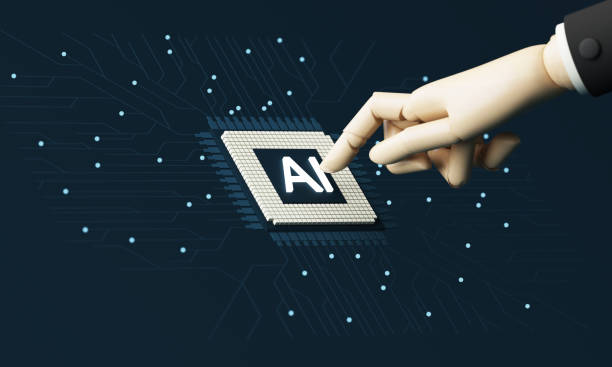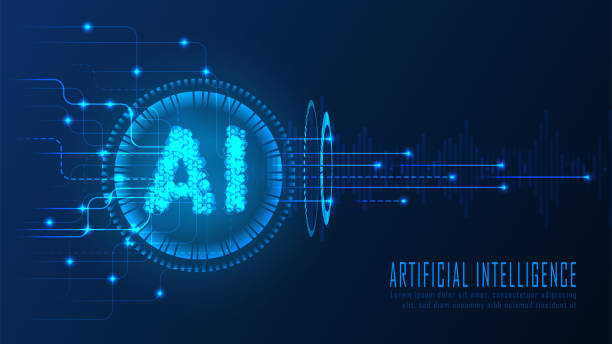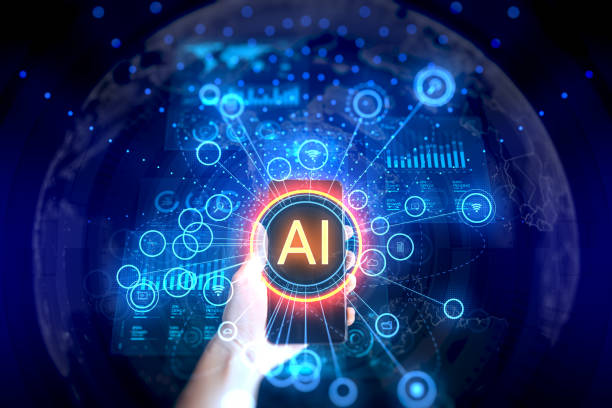What is Artificial Intelligence and How Does it Work?

#Artificial_Intelligence is a branch of computer science that seeks to create systems that can perform tasks that usually require human intelligence.
These tasks include learning, reasoning, problem-solving, understanding natural language, and pattern recognition.
In short, the goal of AI is to build machines that can “think.”
AI uses various algorithms and models to create systems that can solve problems and make decisions.
These algorithms learn from data and improve their performance over time.
Artificial intelligence is rapidly advancing and its applications in our daily lives are increasing.
There are several methods for achieving artificial intelligence.
Machine Learning is one of the most important of these methods, allowing machines to learn from data without explicit programming.
Artificial Neural Networks also play a key role in many AI systems because they are capable of modeling complex patterns in data.
Does your current website create the trust that potential customers should have in your business? If the answer is no, it’s time to have a professional and impactful corporate website with Rasaweb.
✅ Completely custom design tailored to your brand identity
✅ Increase lead generation and credibility of your business in the eyes of customers⚡ Contact us for a free consultation!
A Brief History of Artificial Intelligence

The idea of artificial intelligence dates back to the 1950s, when researchers such as Alan Turing and John McCarthy began exploring the possibility of building intelligent machines.
Over the decades, AI has faced many ups and downs.
There were periods of excitement and optimism, followed by periods of disappointment and budget cuts.
However, recent advances in hardware and software, particularly in the areas of machine learning and big data, have led to a resurgence of AI. Today, we are witnessing widespread applications of AI in various industries.
Among the important milestones in the history of AI is the creation of a chess-playing program that was able to defeat the world champion, as well as the development of speech recognition systems that enabled voice interaction with computers.
Also, advances in Natural Language Processing (NLP) have made it possible for machines to understand and generate text, leading to the creation of chatbots and machine translation systems.
Types of Artificial Intelligence: A Comprehensive Overview

Artificial intelligence can be divided into different categories based on its capabilities and performance.
One of the most common classifications is the distinction between Weak AI and Strong AI.
Weak AI refers to systems that are designed to perform a specific task, such as facial recognition or language translation.
These systems are only “intelligent” within the scope of their defined tasks.
On the other hand, Strong AI refers to systems that can perform any intellectual task that a human can do.
Such systems are still under development and are not widely available.
With learning, machine models help artificial intelligence function better.
There is another classification that divides AI into different types based on how they learn and function, such as Supervised Learning, Unsupervised Learning, and Reinforcement Learning.
Each of these methods is suitable for solving specific problems and is used in various applications.
| Type of Artificial Intelligence | Description |
|---|---|
| Weak AI | Systems designed to perform a specific task. |
| Strong AI | Systems that can perform any intellectual task that a human can do. |
Applications of Artificial Intelligence in Everyday Life

The applications of artificial intelligence are rapidly expanding, and today it can be seen in many aspects of daily life.
Common applications include facial recognition systems in smartphones, movie and music recommendation systems on streaming platforms, and navigation systems in cars.
Also, AI is used in medicine to diagnose diseases and provide personalized treatments. In general, AI is becoming a powerful tool for solving problems and improving efficiency in various industries.
In the #transportation industry, AI plays a fundamental role in the development of self-driving cars.
These cars are capable of understanding their surroundings and making the necessary decisions for driving using sensors and AI algorithms.
In the #finance industry, AI is used to detect fraud and provide investment advice.
In the #education industry, AI can be used to personalize the learning experience and provide automated feedback to students.
Are you discouraged by the low conversion rate of your online store? Rasaweb turns your online store into a powerful tool for attracting and converting customers!
✅ Significant increase in visitor-to-buyer conversion rate
✅ Unique user experience to increase customer satisfaction and loyalty⚡ Get a free consultation from Rasaweb!
Machine Learning: The Cornerstone of Artificial Intelligence

Machine Learning is one of the most important sub-branches of artificial intelligence, which allows machines to learn from data without explicit programming.
In machine learning, algorithms use training data to identify patterns and relationships in the data, and then use these patterns to predict or make decisions about new data.
Machine learning plays a key role in many AI applications, including image recognition, natural language processing, and predicting customer behavior.
There are different types of machine learning algorithms, including supervised learning, unsupervised learning, and reinforcement learning.
In supervised learning, the algorithm learns using training data that has labels (i.e., data for which the correct answer is known).
In unsupervised learning, the algorithm tries to discover patterns and hidden structures in the data using training data that does not have labels.
In reinforcement learning, the algorithm learns how to make the best decisions by taking different actions in an environment and receiving rewards or penalties.
Challenges and Limitations of Artificial Intelligence

Despite its high potential, AI also faces several challenges and limitations.
One of the most important challenges is the need for a large amount of data to train machine learning algorithms.
Machine learning algorithms need a large amount of training data in order to function accurately.
Collecting and labeling this data can be costly and time-consuming.
Another challenge is the issue of #Interpretability.
Many machine learning algorithms, especially deep neural networks, are known as “black boxes” because it is difficult to understand how they arrived at a particular decision.
This issue can be problematic in applications where transparency and accountability are required.
Also, ethical and social issues related to the use of AI, such as #discrimination and #privacy, should also be considered.
The Future of Artificial Intelligence: What Do We Expect?

The future of artificial intelligence looks very bright.
With continuous advances in hardware and software, AI is expected to play an increasingly important role in our lives in the coming years.
AI is predicted to create fundamental transformations in fields such as #healthcare, #transportation, #manufacturing, and #customer_service. AI can be a guide for people to open up many ways for themselves.
Also, strong AI is expected to become a reality in the near future.
Strong AI can have a profound impact on society and create new opportunities and challenges.
Preparing for this future, through research and development, human resource training, and the creation of appropriate legal and ethical frameworks, is of great importance.
AI has many applications.
| Field | Potential impacts of AI |
|---|---|
| Healthcare | More accurate diagnosis of diseases, personalized treatments, surgical robots |
| Transportation | Self-driving cars, intelligent traffic management, reduced accidents |
| Manufacturing | Automation of processes, increased productivity, reduced costs |
Artificial Intelligence and the Jobs of the Future

Artificial intelligence will have a significant impact on the labor market.
Some jobs will be lost due to automation, while new jobs will also be created.
Jobs that involve repetitive and routine tasks are most at risk of automation.
On the other hand, jobs that require unique human skills, such as creativity, empathy, and complex problem-solving, will be less affected by AI.
To succeed in the labor market of the future, individuals must acquire the skills necessary to work with artificial intelligence.
These skills include understanding the principles of AI, the ability to use AI tools, and the ability to solve problems using AI.
Also, soft skills such as critical thinking, communication, and teamwork will become more important.
Does your current website create the trust that potential customers should have in your business? If the answer is no, it’s time to have a professional and impactful corporate website with Rasaweb.
✅ Completely custom design tailored to your brand identity
✅ Increase lead generation and credibility of your business in the eyes of customers⚡ Contact us for a free consultation!
Ethical Considerations in the Development of Artificial Intelligence

The development and use of artificial intelligence is associated with important ethical considerations.
One of the most important of these considerations is the issue of #discrimination.
Machine learning algorithms can be discriminatory if they are trained using discriminatory training data.
For example, a facial recognition system that has been trained using training data primarily from the faces of white people may perform poorly in recognizing the faces of people of color.
In short, #Ethical_AI requires careful attention to ethical issues.
Another ethical consideration is the issue of #privacy.
AI systems can collect and process large amounts of personal data.
This data can be used for various purposes, including targeted advertising and monitoring people’s behavior.
It is necessary to put in place laws and regulations to protect people’s privacy against the misuse of AI data.AI is an emerging phenomenon.
Resources for Learning Artificial Intelligence

Many resources are available for learning artificial intelligence.
Online courses, books, scientific articles, and conferences are among these resources.
Some popular online platforms such as Coursera, Edx, and Udemy offer artificial intelligence courses.
Also, many universities and educational institutions hold in-person AI courses.
AI has wide application.
To start learning AI, it is recommended to start with the basic concepts and then gradually move on to more advanced topics.
Also, practice and practical experience are also very important.
Try to implement small AI projects and work with real data.
AI is a branch of science.
Frequently Asked Questions
| Question | Answer |
|---|---|
| 1. What is Artificial Intelligence (AI)? | It is a branch of computer science that aims to create machines capable of simulating human intelligence and performing tasks that require human thinking, such as learning, problem-solving, and decision-making. |
| 2. What are the main types of AI? | They can be classified into weak AI (Narrow AI) which focuses on a specific task, general AI (General AI) which possesses comprehensive human capabilities, and super AI (Super AI) which surpasses human intelligence. |
| 3. Mention some common AI applications in our daily lives. | These include voice assistants (such as Siri and Alexa), recommendation systems (such as Netflix and Amazon), self-driving cars, facial recognition systems, and spam filters. |
| 4. What is the difference between Artificial Intelligence and Machine Learning? | Artificial intelligence is the broader concept of creating intelligent machines, while machine learning is a subset of artificial intelligence that focuses on enabling systems to learn from data without explicit programming. |
| 5. What is Deep Learning? | It is a subset of machine learning that uses multi-layered artificial neural networks (deep neural networks) to process data and discover complex patterns, and is used in image and speech recognition. |
| 6. What are the most prominent benefits of AI? | Improving efficiency and productivity, automating repetitive tasks, making better decisions based on analyzing large data, and developing solutions to complex problems in areas such as medicine and science. |
| 7. What are the main challenges facing the development and deployment of AI? | These include the need for vast amounts of high-quality data, privacy and security issues, bias in data and algorithms, and high development and maintenance costs. |
| 8. Does AI raise ethical or social concerns? | Yes, it raises concerns related to privacy, algorithmic bias, job loss due to automation, responsibility for errors made by intelligent systems, and the need for a regulatory framework. |
| 9. How can AI affect the future of the labor market? | It can lead to the automation of some routine jobs, but it will also create new jobs that require advanced skills in developing, operating, and maintaining AI systems. |
| 10. What are some modern or promising technologies in the field of AI? | These include advanced natural language processing (NLP) (such as large language models like ChatGPT), computer vision, robotics, and generative AI. |
And other services of Rasa Web Advertising Agency in the field of advertising
Intelligent UI/UX: A professional solution for user interaction with a focus on optimizing key pages.
Intelligent UI/UX: Designed for businesses looking to build digital branding by optimizing key pages.
Intelligent Advertising Campaign: A novel service for increasing customer acquisition through marketing automation.
Intelligent Marketing Automation: Professional optimization to increase click-through rates using attractive user interface design.
Intelligent Data Analysis: A combination of creativity and technology for digital branding by dedicated programming.
And over hundreds of other services in the field of internet advertising, advertising consulting, and organizational solutions
Internet Advertising | Advertising Strategy | Advertorial
Resources
What is Artificial Intelligence?
,Practical applications of artificial intelligence
,Artificial intelligence at IBM
,Everything you need to know about artificial intelligence
? Are you ready to grow your business in the digital world? With the comprehensive services of Rasaweb Afarin Digital Marketing Agency, including online store design and SEO optimization, have a powerful presence in the online market.
📍 Tehran, Mirdamad Street, next to the Central Bank, South Kazerun Alley, Ramin Alley No. 6
“`




